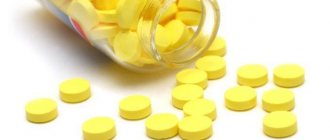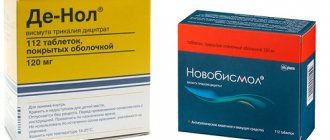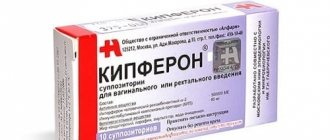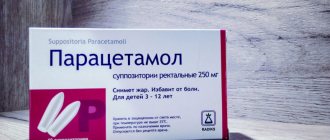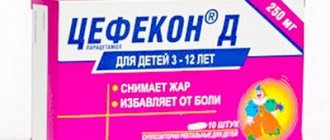What kind of drug is this?
Ibuklin is an anti-inflammatory, antipyretic drug that fights pain of varying intensity. It effectively eliminates pain in muscles, head, ears, and teeth. The medicine lowers body temperature, helps eliminate the source of inflammation, and promotes recovery.
The mechanism of action of the drug is as follows:
- Effectively relieves pain of various types.
- Eliminates weakness, lethargy.
- Affects the source of inflammation, eliminating it.
- Improves the patient's well-being.
- Reduces swelling of joints.
- Reduces temperature.
- Fights inflammatory diseases of the musculoskeletal system.
Compound
High efficiency Ibuklin Junior
due to its rich chemical composition.
The medicine is based on 100 mg of ibuprofen and 125 mg of paracetamol. This mixture quickly reduces temperature, relieves inflammation and relieves pain. The product contains:
- cellulose and lactose;
- starch and mint oil;
- aspartame and glycerol;
- coloring and flavoring.
The dose, selected specifically for children, taking into account the characteristics of their body, has a gentle effect on them. The medicine is completely safe and only in rare cases can it cause side effects.
The ability to dissolve in water greatly simplifies the process of taking the product.
Ibuklin Junior is a non-narcotic pain reliever, but it is dispensed strictly according to a doctor’s prescription. If taken incorrectly, tablets can lead to dizziness, epigastric pain, anxiety, weight loss, nausea and vomiting.
Composition and release forms
The drug contains two active ingredients: ibuprofen and paracetamol. They effectively fight pain and inflammation. Excipients are:
- Corn starch.
- Lactose.
- Glycerol.
- Peppermint leaf oil.
- Orange, pineapple flavoring.
- Silicon dioxide colloidal.
- Magnesium stearate.
- Talc.
Ibuklin Junior is available in the form of pink tablets. They have a fruity and minty smell. Made specifically for children.
Taking medication during pregnancy and breastfeeding
The use of Ibuklin during pregnancy and breastfeeding is prescribed if the woman’s health is in serious danger and immediate use of the drug is required.
The composition of Ibuclin in the form of Ibuprofen and Paracetamol suggests that both substances penetrate well through the placenta and are absorbed into the general bloodstream. Therefore, when taking a pill, it is possible that it may affect the body of a newborn or a baby developing in the womb. All pills are taken only as prescribed by the attending physician.
What do pills help with?
Doctors prescribe this drug for the following ailments:
- Headache.
- Migraine.
- Injuries, sprains, bruises.
- Pain in teeth, ears.
- Inflammatory diseases of the musculoskeletal system.
- Acute viral diseases, colds.
- Otitis.
- Sinusitis.
- Pharyngitis.
- Laryngitis.
- Tonsillitis.
- Inflammatory processes of the respiratory system.
- Fever.
At what age can children?
Doctors allow the use of the drug from the age of three. Taking medication at an earlier age may result in side effects . However, there are cases when doctors prescribe medication to children under three years of age. However, this issue should be discussed with a specialist.
Contraindications and side effects
In some cases, you will have to stop taking this medicine:
- Hypersensitivity to the components of the drug.
- Children under three years of age.
- Tendency to allergies.
- Peptic ulcer of the stomach and duodenum.
- Liver, kidney failure.
- Bronchial asthma.
Side effects are extremely rare . This happens if the dosage of the drug is exceeded, or the drug is taken when there are contraindications. Side effects occur in the form of dizziness, nausea, diarrhea, redness and itching of the skin, swelling, and digestive dysfunction.
Indications
Ibuklin is not recommended for use if there are the following contraindications:
- individual intolerance to the main components of the composition;
- acute course of intestinal and stomach ulcers;
- the presence of bleeding in the digestive tract due to the development of various diseases;
- liver and kidney dysfunction;
- bronchial asthma in combination with intolerance to the active substance and polyposis of the nasal mucosa;
- disruption of the hematopoietic system;
- damage to the optic nerve;
- recovery after bypass surgery;
- failure to absorb glucose;
- chronic inflammation of the large or small intestine.
Ibuklin instructions for use prohibit:
- damage to the optic nerve;
- diseases of the blood system;
- confirmed hyperkalemia;
- children under 12 years of age (tablets for adults);
- children under 3 years of age (subject to the use of a special children's form Ibuklin Junior);
- III trimester of pregnancy, lactation period;
- period after coronary artery bypass surgery;
- increased individual sensitivity to the components of the drug (including other NSAIDs);
- peptic ulcer of the stomach and duodenum in the acute phase;
- gastrointestinal bleeding;
- inflammatory bowel diseases;
- severe renal failure (creatinine clearance less than 30 ml/min);
- active gastrointestinal bleeding;
- genetic absence of glucose-6-phosphate dehydrogenase;
- complete or incomplete combination of bronchial asthma, recurrent polyposis of the nose and paranasal sinuses and intolerance to acetylsalicylic acid or other NSAIDs (including a history);
- progressive kidney disease, severe liver failure or active liver disease.
Instructions for use Ibuklin Junior contains information regarding conditions and diseases for which it is recommended to use tablets:
- Hyperthermia with chills and febrile syndrome;
Ibuklin Junior is an effective remedy for reducing fever in children over two years of age
- Joint diseases with pain: rheumatoid arthritis, osteoarthritis, spinal osteochondrosis, myositis, unspecified spondylosis;
- Pain syndrome: myalgia, dysmenorrhea, migraines, injuries of the musculoskeletal system, toothache, and also after extraction, postoperative pain syndromes;
- Feverish conditions due to colds or flu (rhinitis, sinusitis, sinusitis, tonsillitis, tonsillitis, etc.).
There are a number of diseases for which Ibuklin Junior is not recommended for children:
- Individual sensitivity to individual components of the drug;
- Dyspeptic syndrome;
- Disease of the endocrine system (diabetes mellitus, malfunction of the thyroid gland, etc.);
- Pregnancy (1-3 trimester);
- Breastfeeding period;
- Tendency to hyperkalemia;
- Bleeding disorders;
- Pathologies of the cardiovascular system;
- Bronchial asthma during periods of exacerbation and rest;
- Allergic reaction to medications;
- Children under 2 years old;
The drug should not be given to children under two years of age.
- Erosion and ulcer of the gastrointestinal tract;
- Gastritis, colitis;
- Arterial hypertension;
- Kidney and liver failure;
- Bleeding of various origins;
- Hemorrhagic diathesis;
- Optic nerve diseases;
- Nephrotic syndrome.
This medicine contains two fairly strong active ingredients, which can lead to negative symptoms in the form of:
- Increased excitability;
- Insomnia, dizziness and headaches;
- Impaired visual acuity;
- Nausea, vomiting, bitterness in the mouth;
- The appearance of erosive-ulcerative lesions on the mucous membrane;
- Skin rashes, hives;
- Quincke's edema;
- Disturbances in the normal functioning of the kidneys and urinary system.
An overdose can occur as a result of non-compliance with the dosage recommended by the doctor, taking the medicine for more than 5 days, as well as while taking other incompatible drugs.
Indications for use of the drug (for which Ibuklin tablets are used for symptomatic treatment):
- attacks of neuralgia;
- myalgia;
- toothache;
- painful menstruation;
- pain of varying intensity in the back;
- pain resulting from dislocations, sprains, fractures, severe bruises;
- joint pain, pain resulting from diseases of the musculoskeletal system;
- febrile conditions, including those arising from colds or flu;
- pain syndrome of a postoperative or post-traumatic nature.
The pediatrician will explain in more detail why Ibuklin is used in the treatment of children. You should know exactly what the drug is used for and how it helps, because it can only reduce pain and inflammation during the period of use. Its use does not affect the progress of the disease as a whole.
A sane person would never take medicine without reading the list of contraindications. Mothers need to be a hundred times more careful when choosing medications for their babies. Let’s see what the instructions for Ibuklin say about contraindications, how many “pitfalls” there are in it and for how many years it has been approved.
The drug is not recommended for use:
- children under 3 years of age, pregnant and breastfeeding women;
- with disease of the optic nerve;
- for bronchial asthma;
- in the presence of ulcerative and inflammatory processes in the digestive system, gastric and intestinal bleeding;
- with renal and liver failure;
- in case of individual intolerance to any component of the product.
Directions for use and dosage for children
To cure a child and not harm him, you need to take the drug according to the following regimen:
- Children 3-6 years old are allowed to take up to three tablets per day.
- Children 6-12 years old up to five tablets per day.
- Those aged 12 years and older are allowed to take up to seven tablets per day.
- Before taking, one tablet is dissolved in 5 ml of water and drunk. You are allowed to take only one tablet at a time. In severe conditions, you can take two tablets. The medication is taken between meals.
- The interval between medication doses is 4 hours.
- The drug is used only when necessary: for pain, elevated temperature.
- Do not use the medicine for more than five days, complications may occur.
special instructions
Interaction with other drugs is negative. If you take other medications at the same time, complications may arise and the effectiveness of the drug will decrease. If you need to take medications at the same time as this medication, you should consult your doctor.
The medicine is stored in a dark place out of reach of children . The duration of taking the drug is determined individually. It all depends on the condition of the child, the degree of the disease.
You cannot purchase the drug and give it to a child without a doctor’s prescription. Serious complications are possible.
Analogs
It is not always possible to find this medicine in a pharmacy. If you are unable to purchase the drug, you need to pay attention to analogues that are no less effective. Among the most famous analogues:
- Brustan . The drug relieves pain and effectively fights inflammation. It is produced in the form of tablets. Children only need to take 2-3 tablets a day for treatment.
- Ibuprofen . Eliminates pain in different parts of the body, improves the patient’s well-being. Available for children in the form of a suspension. You need to take it 2-3 times a day. (Read instructions for use for Ibuprofen for children)
- Nurofen . Relieves pain, fights inflammatory diseases. Produced in tablet form. Take the medicine if necessary, one tablet, but no more than three tablets per day. Not for use by children under five years of age.
Ibuklin - instructions for use
The drug Ibuklin has anti-inflammatory, antipyretic and analgesic effects, eliminates the symptoms of flu and colds.
The medication relieves sore throat, high temperature, muscle and headache, pain and fever syndromes of various origins.
The uniqueness of the drug lies in the fact that it is the only combined low-dose drug that can be used in children.
The drug Ibuklin belongs to the group of analgesics, painkillers and antispasmodics. Its active ingredients are ibuprofen and paracetamol.
The drug is produced by the Indian pharmaceutical company Doctor Reddis and is sold in Russia.
Familiarize yourself with the principle of action of the medicine and its method of administration, which are indicated in the instructions for use.
Ibuklin Junior is a drug for children. It is a soluble round tablet of pink color interspersed with a mint aroma. Adult tablets are capsule-shaped, orange in color, packaged in blisters of 10 pcs., packed in boxes of 1 or 2 blisters. Composition of Ibuklin:
| Adult drug | Children's | |
| Ibuprofen concentration, mg per piece. | 400 | 100 |
| Paracetamol level, mg per piece. | 325 | 125 |
| Additional components | Magnesium stearate, corn starch, colloidal silica, microcrystalline cellulose, talc, sodium carboxymethyl starch, glycerol |
pharmachologic effect
The drug is a combination drug, its effect is due to the work of the active components.
Ibuprofen is an anti-inflammatory, antipyretic, analgesic component, under the influence of which the level of prostaglandins in the site of inflammation and in healthy tissues decreases.
The principle of operation of the substance is to inhibit cyclooxygenase, disrupt the metabolism of arachidonic acid, suppress the exudative and proliferative phase of the inflammatory process.
Paracetamol indiscriminately blocks cycloxygenase and has little effect on the mucous membrane of the gastrointestinal tract and water-salt metabolism.
The component has an immediate antipyretic effect, exhibits a thermoregulatory effect, relieves pain, and mutually enhances the effectiveness of ibuprofen.
The drug relieves symptoms of arthralgia at rest and during movement, reduces the feeling of morning stiffness and swelling of the joints, and improves movement.
Ibuprofen is quickly absorbed from the stomach, reaches its maximum concentration after 1–2 hours, binds to plasma proteins by 90%, is slowly absorbed into the joint cavity, and creates a high concentration in the synovial fluid.
90% of the dose of ibuprofen taken is excreted by the kidneys, with bile.
Paracetamol is also quickly adsorbed, binds to albumin by 10%, reaches a maximum concentration after two hours, is metabolized in the liver, and metabolites pass into breast milk.
Indications for use
The instructions for use highlight the indications for the use of Ibuklin for children. These are the following states:
- fever due to a cold or flu;
- attacks of neuralgia;
- myalgia;
- pain of varying intensity in the back;
- joint pain in the musculoskeletal system;
- toothache during teething;
- pain syndromes after dislocations, fractures, sprains, bruises, cuts;
- painful menstruation;
- pain after surgery or injury.
There are instructions for using Ibuklin by children: the tablets are taken orally before meals or 2-3 hours after. They should not be chewed; they must be washed down with plenty of water.
Children under 12 years of age with a body weight over 40 kg should take a tablet twice a day.
If treatment is carried out to reduce temperature, it lasts no more than three days; as a pain reliever for colds, the medicine is used for no longer than five days in a row.
Ibuklin Junior is used by children of any age weighing over 11 kg. A tablet of the drug should be dissolved in a teaspoon of warm water and given to the child to drink.
The maximum dosage for children weighing 11–15 kg is a tablet every 8 hours, a total of three times per day; with a weight of 16-21 kg - every 6 hours, with a weight of 22-40 kg - every eight hours.
If the child weighs over 40 kg, the minimum adult dose is given.
Drug interactions
The combination of Ibuklin with acetylsalicylic acid is undesirable, because this leads to a decrease in the anti-aggregation and anti-inflammatory effect of the latter. Other drug interactions from the instructions:
- When combining the drug with glucocorticosteroids, ethanol, corticotropin, the likelihood of developing ulcers and erosions of the gastrointestinal tract increases.
- Ibuprofen can activate the effect of thrombolytics, colchicine, direct and indirect anticoagulants, and antiplatelet agents on the body. This leads to the development of hemorrhagic complications.
- The drug enhances the hypoglycemic effect of insulin and oral medications with a hypoglycemic effect, so their dose adjustment is required.
- Ibuklin reduces the effectiveness of antihypertensive drugs, diuretics, and enhances the effect of caffeine.
- Ibuprofen enhances the nephrotoxicity of gold drugs and cyclosporine.
- Antacids and cholestyramine can reduce the absorption of the drug.
Side effects and overdose of Ibuklin tablets
Use of the medicine by children may lead to side effects. The instructions highlight the following:
- stomatitis, vomiting, constipation, nausea, dry mouth, heartburn, pancreatitis, epigastric pain, bleeding, diarrhea, erosion, liver dysfunction;
- amblyopia, increased anxiety, aseptic meningitis, dizziness, double vision, decreased hearing or vision, headache, depression, agitation, hallucinations;
- increased sweating;
- heart failure, increased blood pressure, tachycardia;
- leukopenia, thrombocytopenic purpura, anemia, thrombocytopenia;
- shortness of breath, bronchospasm;
- cystitis, acute renal failure, polyuria, edema, allergic nephritis;
- allergy;
- increased activity of liver enzymes, decreased concentrations of glucose, hematocrit, hemoglobin, increased bleeding time.
Taking dispersible tablets for a long time leads to ulcers of the stomach mucosa, vision problems, and bleeding.
According to the instructions, an overdose of the drug in children leads to the development of nausea, vomiting, diarrhea, drowsiness, lethargy, headache, and low blood pressure. Symptoms of overdose are convulsions, tinnitus, fainting, and heart rhythm disturbances.
To eliminate an overdose, you need to rinse the stomach, give the child plenty of alkaline drink, activated carbon. In the hospital, forced diuresis is performed.
special instructions
According to the instructions, treatment with Ibuklin in children is carried out with caution in case of diabetes mellitus, peripheral artery disease, liver cirrhosis, Helicobacter Pylori infection, and a history of gastrointestinal ulcers.
It is prohibited to combine tablets with other non-steroidal anti-inflammatory drugs or ibuprofen or paracetamol in the composition.
During treatment, it is necessary to monitor blood counts and liver function, and monitor plasma sugar and platelet levels at intervals of every 5–10 days.
Contraindications
The instructions for use indicate that there are contraindications for the use of Ibuklin by children. These include:
- exacerbation of duodenal or gastric ulcer;
- hypersensitivity to components;
- bleeding, inflammation of the gastrointestinal tract;
- severe forms of kidney and liver pathologies;
- damage to the optic nerve;
- diseases of the circulatory system;
- polyposis of the nose and paranasal sinuses, bronchial asthma, intolerance to acetylsalicylic acid in the complex;
- hyperkalemia.
Conditions of release and storage
You can buy the medicine without a doctor's prescription; the product should be stored at temperatures up to 25 degrees for five years.
Analogs
Synonyms for Ibuklin are Brustan and Spondifen. Other drugs with similar pharmacological effects can replace the drug:
- Ibuprom - anti-inflammatory tablets containing only ibuprofen;
- Dolaren - antipyretic and analgesic tablets based on paracetamol and diclofenac sodium;
- Khairumat is an analgesic tablet containing ibuprofen and paracetamol.
Price for Ibuklin
You can purchase the drug through pharmacies or the Internet. Their cost depends on the type of medicine, the volume of packaging, and the level of the seller’s markup. Approximate prices in Moscow:
| Type of product | Internet price, rubles | Pharmacy cost, rubles |
| Ibuklin Junior 100+125 mg 20 pcs. | 111 | 120 |
| Ibuklin tablets 400+325 mg 10 pcs. | 129 | 150 |
| Ibuklin tablets 400+325 mg 20 pcs. | 150 | 175 |
Ibuklin - what it helps with and how to use the tablets - get treatment with Wheremed.com
Ibuklin is a combination drug that has antipyretic and anti-inflammatory effects. The medicine has a wide spectrum of action and is prescribed for fever and pain symptoms of various origins. The medication has a gentle effect on the body, so even children can take it. Let's look at the features of the drug and instructions for use.
Description
Ibuklin is available in the form of capsule tablets that have an orange tint. There is a risk on the back. The medication is presented in blisters of 10 pieces. Pharmacies sell cardboard boxes containing 10 and 20 tablets. The main active ingredients are ibuprofen (400 mg per tablet) and paracetamol (325 mg per tablet).
Additional components include: glycerin, cellulose, starch, silicon dioxide, magnesium stearate, talc. Ibuklin has a rapid effect on the body. The maximum effect is noticeable 1-2 hours after administration.
The medication affects the focus of inflammation in tissues and inhibits the activity of prostaglandins. There is a beneficial effect on water-salt metabolism. The drug has antipyretic and analgesic effects. Ibuklin has a positive effect on joints, eliminates swelling, and increases range of motion.
When should I take Ibuklin?
Ibuklin tablets instructions for use - indications for use:
- injuries to joints, ligaments, tendons;
- toothache;
- neuralgia;
- headache;
- bursitis;
- myalgia;
- arthralgia;
- fever;
- rheumatism;
- gout;
- diseases of the ENT organs;
- osteoarthritis;
- adnexitis.
This is important: the medication should be taken as part of complex therapy, since the tablets eliminate inflammation and pain only at the time of use. Ibuklin does not affect the progression of the disease.
Security measures
The use of the drug is prohibited in case of renal failure, individual intolerance to components, diseases of the bleeding organs, gastric ulcers, optic nerve disorders, during pregnancy, and aspirin-induced asthma.
You should use the tablets only as prescribed by a doctor if you have been diagnosed with liver dysfunction, have intestinal erosions, digestive disorders, have heart muscle failure, or are diagnosed with asthma. Caution should be exercised when taking the medication if there is a risk of an allergic reaction. The drug should not be given to children under 12 years of age.
In rare cases, Ibuklin can cause side effects that include the following:
- heartburn;
- abdominal discomfort;
- dry mouth;
- the appearance of ulcers on the mucous membranes of the mouth;
- sleep disorders;
- increased anxiety;
- sudden deterioration in mood;
- increased blood pressure;
- leukopenia;
- swelling;
- cystitis;
- Quincke's edema;
- visual impairment.
Directions for use and dosage
It is recommended to take the tablets before meals. If this is not possible, the medication should be used several hours after the meal. The tablets should be washed down with water, do not chew. A regular interval should be observed between doses of Ibuklin, but not less than 4 hours.
Ibuklin instructions for use of the tablet for adults:
- standard dosage – one tablet 2-3 times a day;
- for severe pain and inflammation - 2 tablets at a time, the daily dose should not exceed 6 pieces of medication;
- the average duration of treatment with tablets as an antipyretic is no more than three days;
- The average duration of treatment with tablets as an anesthetic is no more than 6 days.
Source: https://instrukcia-po-preparatu.ru/proizvoditeli/ibuklin-instruktsiya-po-primeneniyu.html



